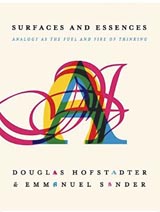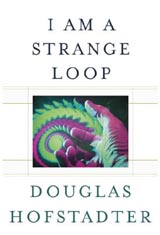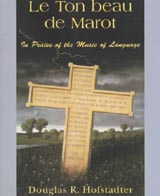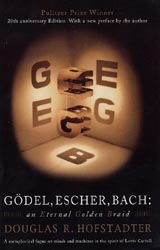
I Am A Strange Loop
Widely respected as one of the world's great thinkers, Douglas Hofstadter is known by his former classmates as a warm, witty, and engaging fellow. A professor of of cognitive science and comparative literature, his research centers around consciousness and high-level perception as director of the Center for Research on Concepts and Cognition at Indiana University.
Hofstadter's prolific writing has received a many awards, including a Pulitzer Prize for general nonfiction for Gödel, Escher, Bach: an Eternal Golden Braid, which was also recognized with the National Book Award for Science. His book I Am a Strange Loop was awarded the Los Angeles Times Book Prize for Science and Technology.
Notable for his contributions in both cognitive science and computer science, Douglas Hofstadter was elected a Fellow of the American Academy of Arts and Sciences and a member of the American Philosophical Society, together with being elected a member of the Royal Society of Sciences in Sweden. He has received the In Praise of Reason award, the highest honor of the Committee for Skeptical Inquiry.

Two authors, two languages, two lives. A bilingual collaboration between two distinguished authors which provided the context for a creative project exploring human thought. Both Surfaces and Essences: Analogy as the Fuel and Fire of Thinking and L’Analogie. Cœur de la pensée are essentially the same book rather than translations of the other. Both editions were created in tandem with each complimenting the other in a deliberative and refined exchange of ideas. Together, Douglas Hofstadter and Emmanuel Sander explore the role of analogy in human cognition, while reflecting upon the nature of intelligence and perception.
The authors begin with the premise that analogy forms the essence of human consciousness and thought. Analogy performs as the core mechanism by which the mind forms concepts and creates categories that enable thought. Analogy is shown to be a continuous and ubiquitous process, one that the authors demonstrate through numerous fascinating and enjoyable examples. This underlying mechanism is illustrated throughout the book across a full range of human activities, from daily experiences to scientific research and discoveries.
It is clear that the authors thoroughly enjoyed working together. Numerous and highly entertaining anecdotes demonstrate important concepts illustrated with stimulating multilingual wordplay extending across many modern languages and cultures. While analogy and categorization are strongly influenced by language, culture, and experience, Hofstadter and Sander demonstrate that the myriad of analogies that continuously sparkle within our consciousness are primarily responsible for memory retrieval and the human ability to make sense of complex situations.

Followers of Douglas Hofstadter's journey into consciousness and self will enjoy his long awaited return to these themes in I Am a Strange Loop, his most recent book on philosophy since the Pulitzer Prize winning Gödel, Escher, Bach.
Breaking new ground in his exploration of the abstract concept of "I," I Am a Strange Loop tackles a number of mysteries involved in the understanding of self and consciousness. Hofstadter expands his original and controversial views by contemplating how thought can arise out of matter, and whether a self, a soul, a consciousness, an "I", can exist as a physical property. This book asks: "What do we mean when we say 'I'?"
For each human being the concept of "I" is the defining reality of life's experience. I Am a Strange Loop examines the physical nature of thought in determining how this concept of "I" might have the ability to exert genuine power over the particles composing our brain. Comparing this phenomenon to its corollary, Hofstadter also considers whether consciousness is instead the end result of the laws of physics, that in effect control those same particles of matter which constitute our minds.
Hofstadter's compelling style awakens the reader to the proposition that a special type of feedback loop inhabits our brains, the "strange loop," a concept that forms the key to understanding selves and consciousness. He describes the particles composing our brain, beginning as a chaotic and seething soup that rises into a jungle of neurons; these neurons in turn form a network of abstractions that we call "symbols" leading up to the most central and complex symbol being the one that we conceive as "I." With "I" as the nexus of this multi-layered mass, the constituent layers are shown to continuously feed back upon one another to the extent where the layers known as "symbols" have acquired the paradoxical ability to control the physical particles of which they are made.

In Le Ton Beau de Marot, Hofstadter offers an exciting look at the issues involved in translation. In praise of the music of language, this book takes as its point of departure the translation of a poem by Clement Marot, and goes on to delve into creativity, art, and everything. Poetic translation is the soul of this book, and Hofstadter subscribes to the school of translation believing that the medium and the message are equally important.
This book was inspired by the author's encounters in choosing specific language while translating a short poem by an obscure French Renaissance poet named Clement Marot. Hofstadter, after tackling this challenge himself, sent out a letter to many friends challenging them to translate it as well.
Most of the book elucidates discussions of some of the dilemmas of literary translation, with examples drawn from various literary works. Among Hofstadter's favorite examples is Alexander Pushkin's quintessential Russian novel in verse, Eugene Onegin.
Readers of Le Ton beau de Marot will be delighted to see his meticulous theories of translation put into practice his English language translation of Alexander Pushkin's novel-in-verse: Eugene Onegin Hofstadter employs Pushkin's demanding original rhyme scheme, devising dozens of ingenious rhymes-and recounts his delighted immersion in Pushkin and the Russian language, in a beguiling preface that's almost as much fun as the immortal Eugene Onegin itself, according to Kirkus Reviews.
Douglas tackles the subject of artificial intelligence and machine learning in his thought-provoking work Fluid Concepts and Creative Analogies, written in conjunction with the Fluid Analogies Research Group at the University of Michigan. What has emerged is a sophisticated and unorthodox vision of the mind in which perception, at an abstract level, is the key: perception of situations, of patterns, of patterns among patterns.
Hofstadter challenges conventional computer simulations of reasoning. He discusses the importance of how concepts give rise to generalizations and analogies, and asserts that mental activities are fundamentally parallel. He illustrates these principles with computer models for solving anagram, analogy, and number puzzles.
Metamagical Themas : Questing for the Essence of Mind and Pattern is a bestselling collection of brilliant and quirky essays, on subjects ranging from biology to grammar to artificial intelligence, that are unified by one primary concern: the way people perceive and think. Many of the essays were originally published in Scientific American when Hofstadter continued the column on mathematical puzzles originally penned by the legendary Martin Gardner.
The Mind's I: Fantasies and Reflections on Self & Soul is a collection of the 20th century's greatest thinkers, essays on topics as diverse as artificial intelligence, evolution, science fiction, philosophy, reductionism, and consciousness. Edited by Douglas Hofstadter and Daniel C. Dennett, with contributions from Jorge Luis Borges, Richard Dawkins, John Searle, and Robert Nozick, The Mind's I explores the meaning of self and consciousness through the perspectives of literature, artificial intelligence, psychology, and other disciplines.
Winner of the Pulitzer Prize, Gödel, Escher, Bach: an Eternal Golden Braid applies Gödel's seminal contribution to modern mathematics to the study of the human mind and the development of artificial intelligence.

Aside from being a profound and entertaining meditation on human thought and creativity, this book looks at the surprising points of contact between the music of Bach, the artwork of Escher, and the mathematics of Gödel. It also looks at the prospects for computers and artificial intelligence for mimicking human thought. Twenty years after it topped the bestseller charts, the book is still something of a marvel.
Borrowing a page from Lewis Carroll, each chapter presents dialogue between the Tortoise and Achilles, as well as other characters who dramatize concepts discussed later in more detail. Allusions to Bach's music and Escher's continually paradoxical artwork are plentiful. This more approachable material lets the reader delve into serious number theory,concentrating on the ramifications of Gödel's Theorem of Incompleteness, while stopping along the way to ponder the work of a host of other mathematicians, artists, and thinkers.
Gödel, Escher, Bach: an Eternal Golden Braid is also the recipient of the American Book Award in the Science category in 1980.




